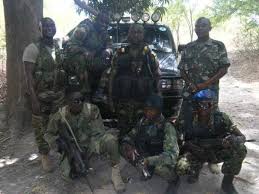Some detained ex-members of former president Yahya Jammeh’s infamous paramilitary death squad are being considered for release after owning up to their roles in killings but who were Gambia’s feared Junglers?
The jungler term entered the Gambian national consciousness in the early 2000s, the formative years of the group which would eventually strike terror in the heart of citizens.
Since The Gambia’s Truth Reconciliation and Reparations Commission began hearings on the activities of the hit squad in July, successive former members have acknowledged their roles in the litany of killings between 2003 and 2016 the year Jammeh lost power through elections.
As witnesses have testified, the junglers were directly under the thumb and command of Mr. Jammeh.
Under his watch, the junglers systematically eliminated his foes, both real and imagined for over a decade.
The junglers were believed to have come to their element during the notorious purge of 2006, following an abortive coup which Jammeh had survived.
Made up of handpicked presidential guards and some regular soldiers of the Gambian Armed Forces, the purported killing machine came into being along with a parallel group known simply as the Patrol Team whose initial task was to scour the border and tackle cross-border crimes and terrorism.
In the intervening few years, both squads would eventually merge into a single entity under the jungler name.
It soon developed a notoriety for being a ruthless killing machine, taking down Jammeh’s political opponents, including local politicians, journalists, intelligence operatives, foreign nationals and even taxi drivers.
Like in the terror days of Idi Amin’s Uganda, the Junglers stalked, trailed, lured or trapped their victims to places where they would be neutralized without drawing much attention to the act or to themselves.
They had in their midst names that sent shivers down the spines of many Gambians including the late Tumbul Tamba, Sanna Manjang and Musa Jammeh known as Malyamungu (named after Amin’s bloodthirsty executioner in chief).
According to testimonies to the TRRC one of the junglers’ early victims was newspaper proprietor and editor Deyda Hydara who was killed in a drive-by shooting in December 2004.
Malick Jatta, a former member of the death squad told the commission that they had conducted some reconnaissance on Hydara shortly, trailing his car using a taxi they used for the operation to gun him down.
Their proximity to power made it easy for the assassins to dispose of evidence with consummate ease, such as the taxi used in Hydara’s killing which has never been found.
Omar A. Jallow, a former assassin who confessed to participating in the killing of some 48 people mostly civilians told the TRRC that the death squad ordinarily consisted of at least 30 operatives at any given time.
There was no established criteria for selecting members to the squad, meaning they were handpicked by those on high who would have their own standards for initiating future Jungulars into the fold.
The first ritual for any jungler was to swear an oath of secrecy which would keep the activities of the group away from public glare.
All their activities were supposed to be at the behest of Yahya Jammeh who would give orders through jungler leader Nuha Badjie, a suspect believed to have fled the country.
According to Omar A. Jallow the second batch of junglers was trained in 2004, a year that was characterized by arson attacks on journalists, assassinations and attempted assassinations and kidnappings.
Their modus operandi was to operate in complete secrecy where Junglers were not even allowed to share information or views amongst themselves.
Ex-jungler Jalllow said they used different ways of killing their victims, namely by strangulating, suffocating as was the case with former Jammeh ally Baba Jobe.
Ex-jungler Amadou Badjie said torture was a way of extracting information or forcing victims to own up to acts they may not even have committed.
Like their counterparts in other parts of the world, operatives were usually high on drugs and alcohol.
Where are they?
While some Junglers like Malick Jatta, Omar A. Jallow and Amadou Badjie are being detained and may be considered for release, others like Sanna Manjang, Michael Sang Correa and Muhammed Sambou and Paul Bojang among others are still at large, believed to have all fled the country.
WN/as/APA


